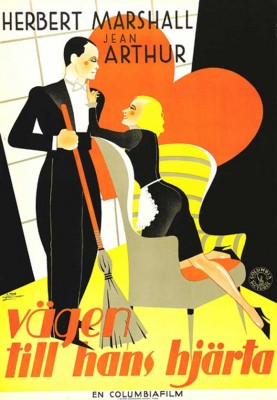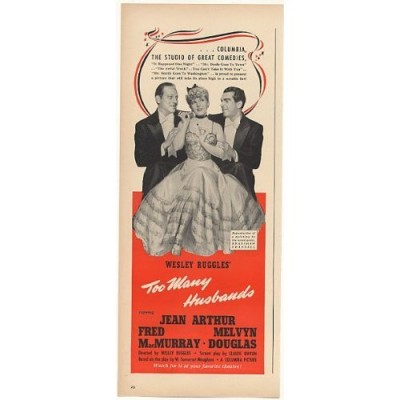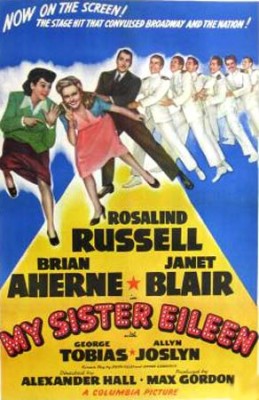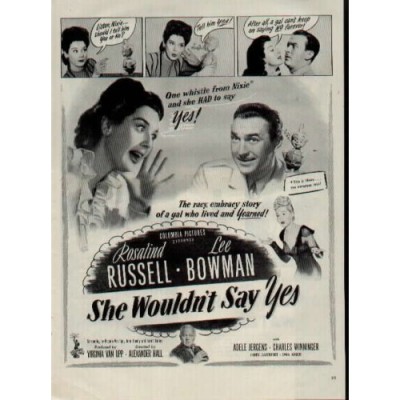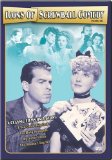| Reviews & Columns |
|
Reviews DVD TV on DVD Blu-ray 4K UHD International DVDs In Theaters Reviews by Studio Video Games Features Collector Series DVDs Easter Egg Database Interviews DVD Talk Radio Feature Articles Columns Anime Talk DVD Savant Horror DVDs The M.O.D. Squad Art House HD Talk Silent DVD
|
DVD Talk Forum |
|
|
| Resources |
|
DVD Price Search Customer Service #'s RCE Info Links |
|
Columns
|
|
|
Icons of Screwball Comedy, Volume One (If You Could Only Cook/Too Many Husbands/My Sister Eileen/She Wouldn't Say Yes)
A neat little gem, If You Could Only Cook is compact and concise, with a taut 72-minute running time and, essentially, just four major characters. It was written by Howard J. Green (I Am a Fugitive from a Chain Gang, It's a Gift) and Gertrude Purcell (Destry Rides Again) from a story by F. Hugh Herbert (not Hugh Herbert, the comedian) and directed by William A. Seiter.
Herbert Marshall is top-billed as Jim Buchanan, automobile magnate, who's unhappy that a) he's about to get married to a woman of breeding (Frieda Inescort) he doesn't love; and b) his conservative, anti-innovative board of directors refuses to move ahead with his forward-thinking futuristic automobile designs.
Depressed and sitting on a park bench, he strikes up a conversation with an unemployed, recently evicted young woman, Joan (Jean Arthur), who mistakes him for yet another victim of the Depression. When she reads a help wanted ad for a butler and a cook, she suggests they apply for the positions together, pretending to be a married couple with experience as domestic servants. Amused by the mix-up and impressed by her tenacity he agrees, and the two are hired by genial Italian gangster Mike Rossini (Leo Carrillo), a former bootlegger looking for a new angle, and his lieutenant, sardonic thug Flash (Lionel Stander).
This is a really sweet film that's exceptionally well cast. Though I'd watch Jean Arthur in just about anything, teaming her with Herbert Marshall was truly inspired; it's a real pity they didn't do more films together. Her Joan is warm and friendly but quietly desperate for work; as she tells Jim, she's got no burning desire to spend the night sleeping on a park bench. He's intelligent and cultured but romantic and certainly no snob. And when the two begin to fall in love there's a real chemistry, an authenticity one sees in few films; two outstanding performances that deserve a lot more attention.
Similarly Leo Carrillo (later Pancho on The Cisco Kid), maniacally rolling his eyes and floridly gesturing throughout, makes a funny contrast to stoic, cynical Lionel Stander.
The film's Capra-esque qualities were not lost on Columbia. In a brazen display of chutzpah, Harry Cohn sent the film abroad as "A Frank Capra Production" and, according to Leonard Maltin's Classic Movie Guide, "Capra's name as director in many European prints." These were totally fraudulent claims and Capra himself was not pleased; a yearlong dispute and lawsuit resulted. (**** out of *****)
If the title didn't already give it away, the entire plot of Too Many Husbands can be gleaned just 2 1/2 minutes into the picture, exposition explaining that Vicky (Jean Arthur again), after first husband Bill Cardew (Fred MacMurray) is lost at sea and presumed drowned, has in the past year married her husband's best friend and publishing partner, Henry Lowndes (Melvyn Douglas). Any guesses as to what happens next?
You got it: Bill turns up, looking like Tom Hanks at the end of Cast Away, though unlike Tom is totally unfazed by the experience. ("The things I ate," he says with a laugh.) He returns home and the madcap complications of Vicky's multiple marriages play out, as her father, George (Henry Davenport), and butler, Peter (Melville Cooper), watch from the sidelines.
What might have been a drearily predictable formula comedy gets a big boost from its three leads and a clever script by Claude Binyon (It's a Gift and several other W.C. Fields comedies), from W. Somerset Maugham's play. The screenplay plays out all the obvious and many unexpected complications of a woman trying to choose between her first and second husbands, both of whom she loves equally. Some of it is predictable but funny, such as when Bill and Vicky are reunited, and because she doesn't have the heart to break the news about Henry, all Henry can do is watch helplessly as Bill smothers Vicki with kisses, while offering Henry a drink in his own house, from his own liquor cabinet, etc. There's an awful lot of amusing double-entendres, and generally it's surprising the film's basic set-up made it past the Hays Office.
Where the film really gets interesting is where Vicky actually begins to delight in watching her two husbands fight for her affections. For her watching them squirm is exciting; suddenly she has all the power and the two men who once took her for granted now fall over themselves showering her with affection. Most actresses would have come off as unsympathetic Jezebels, but Jean Arthur turns a unique situation into a liberating experience. It's a great vehicle for her, allowing a full gamut of emotions; she gives a fascinating, superb performance, and both MacMurray and Douglas are at her level.
The film only disappoints at the end, sort of fulfilling Production Code requirements while at the same time unsatisfactorily leaving the basic situation unresolved. (*** 1/2)
Adapted from a popular 1940 play that in turn was inspired by a series of popular autobiographical stories originally published in The New Yorker, Columbia's 1942 film of My Sister Eileen starts out well and has a good, Oscar-nominated performance by a somewhat miscast Rosalind Russell, but it runs out of steam long before it's over.
The basic story centers around two very different sisters from Columbus, Ohio: Ruth (Russell), a supposedly plain-looking, sensible young woman wanting to make it as a writer; and Eileen (Janet Blair), an indefatigable, gorgeous blonde who dreams of becoming an famous actress, and who because of her beauty has a long line of men anxious to take care of her. The girls move to Greenwich Village in Lower Manhattan, determined to make it on their own without the financial support of their doting father (Grant Mitchell). To save money they rent an abysmal basement apartment from shady Mr. Appopolous (George Tobias) where, among other things, construction workers are dynamiting a new subway extension directly below the beds.
The girls contend with various eccentric neighbors and men eager to bed down Eileen: there's punch drunk, unemployed Loomis (Gordon Jones from The Abbott & Costello Show) and his wife ("Miss" Jeff Donnell); sleazy newspaperman Chic Clark (Allyn Joslyn); Effie Shelton (June Havoc), the "medium" (read: hooker) who used to live in the apartment; and Officer Lonigan (Donald MacBride), who's convinced the two girls are in the same line of work. (The film cleverly dances around Production Code restrictions, with numerous allusions to prostitution.) What story there is involves a magazine editor Robert Baker (Brian Aherne) and his efforts to get Ruth's stories published, and Ruth's concerns that Eileen might steal him away like all the other men.
Though Russell is too glamorous and at 35 too old to be believed as Eileen's undesirable older sister or a naïve young career woman, she's nonetheless excellent throughout, determined and cynical, loving and supportive toward Eileen, and Russell and Blair are well matched. Ruth's hard to take seriously as a writer, however: In the opening scene, she's working for an Ohio newspaper and putting the finishing touches on a rave review of her own sister's stage debut (in Ibsen's A Doll's House, no less) - hours before the performance because, well, she's going to a big party after the show and won't have time to write it up later.
Like the ever-growing Conga line near the end of the film, the laundry list of eccentric characters becomes wearying after a while, especially by the time a contingent of Portuguese merchant marines show up. The film is also too stagy, very much with the look of a filmed play.
Two tangential notes: The real-life Ruth and Eileen McKenney had mostly tragic lives sharply contrasting the carefree ones presented here. Eileen died in a car crash with her husband, Nathanael West, four days before the play's Broadway opening. Shortly after the musical remake of My Sister Eileen (1955) opened (with Betty Garrett more reasonably cast as Ruth), the real Ruth McKenney's husband committed suicide, on Ruth's 44th birthday.
The Three Stooges, at the time consisting of Moe Howard, Larry Fine, and Curly Howard, appear briefly in the picture. The listing on Amazon suggests they're one (well, three) of the film's stars, but their unbilled gag appearance comes literally in the last five seconds, and is so fleeting you can barely see Moe face as the words "The End" are superimposed for the fade out. (** 1/2)
Even less believable but better overall is She Wouldn't Say Yes, which has a strong first act (set mainly aboard a train), another lively performance by Russell, and features a one-of-a-kind supporting cast. This time Russell is a Dr. Susan Lane, a glamorous psychiatrist who, in the opening scene, is treating returning soldiers with what today we'd call post-traumatic stress syndrome, clearly prime material for a screwball comedy. But before the film can turn into a slapstick Let There Be Light, Susan finds herself leaving town and inadvertently sharing a Pullman car berth with Michael Kent (Lee Bowman), creator of a popular funny pages strip called "The Nixie."
The pixyish Nixie, who looks like a demented Porky Pig, unleashes the Id of those who long to cut loose once in their lives, a philosophy Michael shares, while Susan's treatment is based on the very opposite approach, of keeping one's Id on a tight leash, if not tightly locked away in a closet. Predictably, Michael's look on life wins out in the end, in a Doctor-heal-thyself script that's entertaining despite the fact that it's flagrantly chauvinistic and anti-psychiatric therapy, at least when an unmarried woman's the doctor. Consider Russell's epiphany near the end: "Every woman should be a wife, shouldn't she?"
Bowman (Buck Privates) is okay at best, but the supporting cast is great. An almost unrecognizable Darren McGavin makes his screen debut as "The Kid," and aboard the train are black porters played by an all-star cast of great comic actors: Willie Best, Dudley Dickerson, Nick Stewart, Clarence Muse, and Mantan Moreland. What a line-up!
The actor who was the voice of Elmer Fudd, Arthur Q. Bryan, rarely had more than a line or two in his live-action movie appearance, but in She Wouldn't Say Yes actually has a pretty big (if unbilled) part and appears in several scenes, all funny. Sexy Adele Jergens and Pa Kettle Percy Kilbride have larger roles, while Al Bridge, George Cleveland, Carl "Alfalfa" Switzer, and many others make memorable, brief appearances. (*** 1/2)
Video & Audio
Presented in their original full frame theatrical aspect ratios with two films per single-sided, dual-layered disc, all four features are given decent transfers. Though short of perfection, they're comparable to other big studio titles from the mid-1930s through mid-'40s. All are mono releases but the fidelity in these Dolby Digital mixes is quite good; all offer optional English subtitles.
Extra Features
Trailers for the two Russell films are included; the one for She Wouldn't Say Yes inexplicably presented window-boxed and reduced to the size of a postage stamp.
Although the 190 two-reel comedies the Three Stooges made at Columbia are almost impossible to avoid, the studio's other short comedies have been frustratingly elusive. To their credit, Sony did release a collection of Buster Keaton's two-reelers from the late-1930s a few years back, and they turned out to be much funnier than their reputation would suggest. Another silent clown, Charley Chase, made his last shorts at Columbia and one of these, The Heckler (1940), is one of the funniest two-reelers I've ever seen. Ain't Love Cuckoo? (1946), included here, is on the other hand almost fascinating in its awfulness. It was the second of about a dozen shorts teaming skittish, milquetoasty Gus Schilling with overbearing, short-fused Richard Lane.
As far as I know, neither had a background in Vaudeville or burlesque; they were simply character actors (Schilling has a juicy little part in Citizen Kane, for instance) somebody, probably producer-director Jules White, thought would make a good comedy team, but this short about accidental wife-swapping - a complex set-up detailed by a cuckoo clock's cuckoo (played by Jean Willes, meooowww!) - is frenetic instead of funny. However, it's funny to see it play out in The Three Stooges universe, with the same over-the-top sound effects and bit players (here including Emil Sitka as a bellhop, John Tyrell as a bartender).
Parting Thoughts
Although the two Jean Arthurs are better than the two Rosalind Russells, all four films are worth a look, and for the price this is a terrific deal. Highly Recommended.
* I've heard a collection of Columbia Charley Chase shorts has been finished and raring to street for some time. Let's hope the waning DVD market can support it.
Film historian Stuart Galbraith IV's latest books, Japanese Cinema and The Toho Studios Story, are on sale now.
|
| Popular Reviews |
| Sponsored Links |
|
|
| Sponsored Links |
|
|
| Release List | Reviews | Shop | Newsletter | Forum | DVD Giveaways | Blu-Ray | Advertise |
|
Copyright 2024 DVDTalk.com All Rights Reserved. Legal Info, Privacy Policy, Terms of Use,
Manage Preferences,
Your Privacy Choices | |||||||









